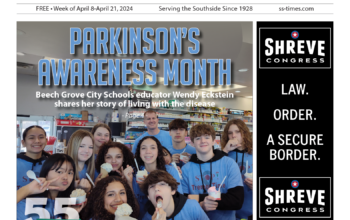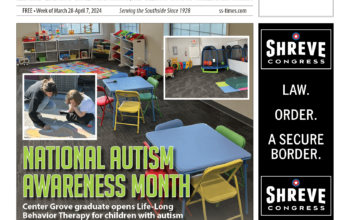The Indianapolis-based nonprofit arts organization, Big Car Collaborative, has regranted a total of $60,000 to artists living and working in the Indianapolis area. These Power Plant Grants — made possible by The Andy Warhol Foundation for the Visual Arts based in New York — fund visual artists and collectives producing public-facing work that’s experimental and brings new energy to the city’s arts community.
Big Car is one of 32 regional regranting organizations across the United States working to support artists via funds from The Andy Warhol Foundation for the Visual Arts. “We are grateful to our Regional Regranting Program partners at Big Car Collaborative for their ongoing dedication to supporting artists in the Indianapolis area,” said Khadija Nia Adell, Regional Regranting program manager. “The Warhol Foundation is excited to see the projects awarded in this cycle come to fruition and to continue to help artists thrive and make thoughtful and exciting contributions to their communities.”

This is the third round of Power Plant Grants in Indianapolis. The program started here in 2020 as emergency grants distributed during the height of the pandemic. Big Car also awarded $60,000 in project grants to artists and artist-run spaces in 2021 and 2022.
“Power Plant Grants energize the Indianapolis arts community and support visual artists by encouraging them to grow by taking chances, realizing untapped potential, trying experimental projects, collaborating with each other, and bringing work to unusual places,” said Big Car program director Shauta Marsh. “We’re excited by the quality, dedication and innovation we see in the work of these artists in our city. We’re so glad to be able to support them and what they’re bringing to audiences in Indianapolis.”
Power Plant Grants support visual artists who live, work, or run spaces in Indianapolis with six project grants of $10,000. This year’s awardees were selected by past Power Plant winner Andrea Jandernoa, Indiana-based artist Kelvin Burzon and Cierra Rembert of SPACES in Cleveland.
These are the funded projects for 2023:
Zola Lamothe “Ransom Place: Unveiling a Forgotten Legacy.” This project will center around recreating household and community scenes on the Indiana University Indianapolis campus where people’s homes, churches and livelihoods once stood. Lamothe’s goal is that viewers will be able to not only witness the juxtaposition of what the land housed then and now but also bear witness to what was lost and wonder what could have been. The work will be released and shared with the community along with information about Indiana laws and future reform to avoid gentrification and displacement. In addition to the public gallery exhibition, Lamothe also plans to donate prints to the Through 2 Eyes organization that offers Indianapolis walking tours on the city’s history.
Lamothe hopes to release a photo book of the project that includes quotes and interviews from those who used to live in Ransom Place and their descendants. Her goal is for the book to be available in public libraries, the Indiana University Indianapolis bookstore and the Indiana State Museum gallery shop.
Lauren Daughtery: Transformal Textiles

Lauren Daughtery
Textile Transformations will focus on themes of grief and loss, transformation and empowerment through textile work. Using textiles related to a late child (crib sheets, clothing, colors associated with the nursery, etc), mothers will create their own textile work to memorialize their child and to provide a process-based approach for containing and transforming thoughts and emotions.
Textile work has been found to be beneficial in trauma work, allowing women to cope with grief, depression and other physical ailments. Working in textiles provides sensory stimulation, promotes a feeling of centeredness or grounding, and can be used as a coping mechanism that can improve mood. This grant will support two iterations of Textile Transformations. Any mother who has experienced loss of a child due to miscarriage, birth trauma, post-birth complications, or any other means will be invited to participate. Sessions will be led by an art therapist and practicing artist alongside a licensed mental health counselor. There will be an optional exhibition for the participants.
Kelsey Simpson: Railroad City Bookmobile

Railroad City Bookmobile is an extension of the work that the locally based Gluestick group does within the Indianapolis community including teaching workshops, distributing free art supplies, publishing collaborative zines and hosting an annual festival. As the digital world takes over, books and zine making are becoming more like art objects. Our plan is to fill a small vehicle with zines, comic books and general interest books and distribute them across Indianapolis. In the long run we would love to make connections with community representatives and make return visits to certain locations. We envision ourselves having an item for everyone. We would love to connect with Hoosiers and ask what they would like to read or share with others. We want to see the bookmobile become a collaborative project with all who encounter it.
The Power Plant Grant will be used to purchase a vehicle and transform it into the Railroad City Bookmobile. This mobile workshop will make its public debut at a Read-in event with workshops and other creative opportunities for visitors at the Major Taylor Skatepark on the Near Westside of Indianapolis. Gluestick plans to document the Read-in experience and publish it as a zine to promote the Railroad City Bookmobile.
Bryn Jackson and April Knauber: Markings of Remembrance.

Bryn Jackson and April Knauber
This collaboration engages a form of Filipino storytelling through abstract patterns found in ancestral body art, or tatak. By engaging stateside practitioners, ancestral objects, colonial-era manuscripts and contemporary texts, Jackson and Knauber see their ultimate goal to be creating space for collective remembrance and understanding of an artform nearly lost to hundreds of years of religious and political subjugation of the indigenous peoples of the islands now known as the Philippines.
Prior to the creation of new sculptural and video works, the project will consist of the formation of a cohort of Filipinos interested in researching their lineage and sharing their findings and personal experiences, continuing a long tradition of cultivating collective memory through oral history, which will inform a tailored curriculum through which the group will learn about the archetypal symbols central to various Filipino tattoo traditions.
Jackson and Knauber will research and share individual histories, the islands from which their families migrated, the languages spoken within their families and the roles family members held within their communities.
Carlos Sosa: “Reflexiónes de Los Júziers: A New Visual Ethnonym and A New Consciousness Portrait Series”

Sosa will produce and exhibit a dozen multimedia artworks — portraits, dioramas and textile pieces — with accompanying text in Spanish and English. The work is based on decades-old photos of Hispanic individuals and families with roots in Latin America who chose to call Indiana their home. The artworks will be displayed in high-traffic areas in multiple parts of Indiana. Also, during scheduled discussions and public meetings, these images will foster dialogue to address issues of identity and immigration, migration and borders in our own lives.
Sosa’s goal is for these works to help us think more about identity, survival, energy and movement. Today’s Júziers will hopefully connect with “their” origin stories: a collection of faces and narratives that are easy to explore and make their own. His approach is focused on the belief that images will reflect or provide access to a period’s views and actively participate in acknowledging those views de vida in the first place. A history of images has an impact on remaking, which itself constitutes a valuable record and purpose of people’s lived lives.
Evren Wilder Elliott: “Imagining Home: Liberatory Theatre and Speculative Solutions for Housing Justice”

Evren Wilder Eilliott
Elliot’s social practice and performance art project, “Imagining Home: Liberatory Theatre and Speculative Solutions for Housing Justice” aims to utilize critical dialogue, art and liberatory theater to examine the housing crisis in Indianapolis, specifically among the experiences of Black, Latine, Indigenous, LGBTQ2S+ and other historically marginalized communities.
By gathering community members affected by housing insecurity, as well as partnering with local organizations within the Indianapolis Housing Continuum of Care, we will engage in play, improvisation, imagination and storytelling practices to collectively envision solutions and policies that can drive meaningful change. This project will employ a participatory approach, inviting individuals to become co-creators and active agents in the exploration of housing issues. Through a series of workshops, participants will be encouraged to develop their narratives through story circles, written accounts, performance, image-making and other creative mediums.

